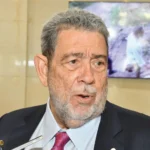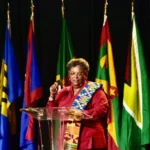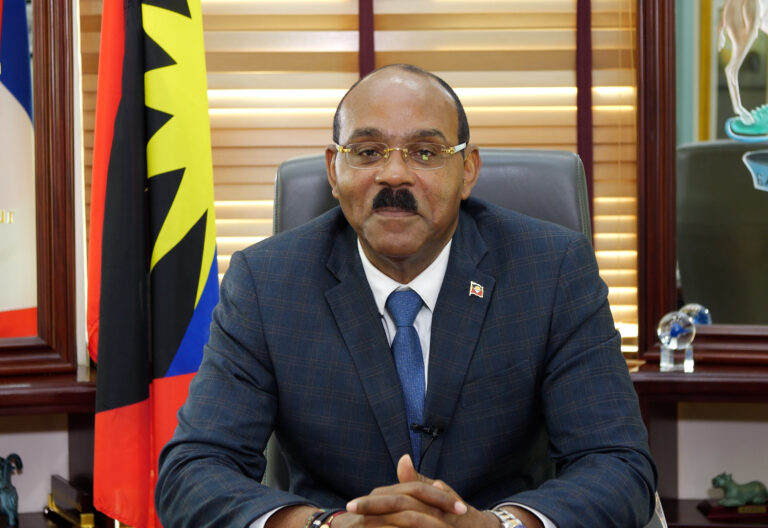1. Good morning, Mr. President, Members of the Tribunal,
2. I am honoured to appear before you to open the oral pleadings of the Commission of Small Island States on Climate Change and International Law in these historic advisory proceedings.
3. As Prime Minister of Antigua and Barbuda, I serve as Co-Chair of the Commission, also referred to as COSIS, alongside my friend Honourable Kausea Natano, the Prime Minister of Tuvalu, who will be addressing you shortly.
4. Antigua and Barbuda and Tuvalu concluded the Agreement establishing COSIS on 31 October 2021, on the eve of the 26th Conference of the Parties to the UN Framework Convention on Climate Change, or UNFCCC, held in Glasgow, United Kingdom. On 5 November 2021, at COP26, the Republic of Palau became the first State to deposit its instrument of accession. This was followed, in chronological order, by Niue in September 2022, the Republic of Vanuatu and Saint Lucia in December 2022, and Saint Vincent and the Grenadines, Saint Christopher (Saint Kitts) and Nevis, and the Commonwealth of The Bahamas in June 2023. The nine Member States of COSIS are scattered across the globe but are united by a deep connection to and dependence on the marine environment and its resources.
5. We also note with gratitude the supportive written statements in these proceedings by other members of the Alliance of Small Island States: Belize, the Republic of Mauritius, the Federated States of Micronesia, the Republic of Nauru, and the Republic of Singapore.
6. Mr. President, COSIS is an unprecedented inter-governmental organization.
7. Its purpose is to harness the potential of international law to protect the most climate vulnerable States against existential threats.
8. It is no exaggeration to speak of existential threats, when some of these nations may vanish in the foreseeable future because of rising sea-levels.
9. The scientific evidence leaves no doubt that this situation has arisen because of the failure of major polluters to effectively mitigate greenhouse gas emissions.
10. This inaction, this failure of political will, has brought humankind to a perilous juncture with catastrophic consequences.
11. It is because of this reality that COSIS has brought this vital matter before you.
12. In view of this reality, one can scarcely imagine a more compelling reason to establish an inter-governmental organization. As the preamble to the Agreement states, COSIS members are “[a]larmed by the catastrophic effects of climate change which threaten the survival of Small Island States, and in some cases, their very existence.”It is for this purpose that the Commission’s mandate is “to promote and contribute to the definition, implementation, and progressive development of rules and principles of international law concerning climate change.”
13. These advisory proceedings before your Tribunal are the first, but not the last, initiative of COSIS. The Commission has also been authorized to submit a written statement for the ICJ advisory opinion on climate change requested by the UN General Assembly on 29 March 2023; a historic resolution adopted by consensus, under the leadership of the Republic of Vanuatu, with the active support of numerous small island States, including Antigua and Barbuda. COSIS will also submit a written statement for the advisory opinion proceedings before the Inter-American Court of Human Rights, requested by Chile and Colombia on 9 January 2023. And there will be yet more initiatives as small island States join forces to protect their rights and very existence by building a rule-oriented international order in which the major polluters are held accountable for the harm they have caused and continue to cause. It cannot be expected that our peoples will remain silent as their homes are irretrievably destroyed.
14. Despite these multiple initiatives though, this initial request before ITLOS is particularly significant.
15. This is the opening chapter in the struggle to change the conduct of the international community by clarifying the obligation of States to protect the marine environment.
16. We are after all peoples of the ocean, whether in the Caribbean or the Pacific, in the Atlantic or Indian Oceans, surrounded by the vast expanses of water that have sustained us from time immemorial.
17. In this regard, the COSIS Agreement explicitly acknowledges the fundamental importance of oceans as sinks and reservoirs of greenhouse gases, and the direct relevance of the marine environment to the adverse effects of climate change on Small Island States.
18. The ocean is fundamental to the climate system of the Earth, so it is befitting that the first in these series of proceedings should be before ITLOS, the guardian of the 1982 UN Convention on the Law of the Sea.
19. It is befitting no less because in the past weeks this summer we have witnessed the highest ocean temperatures on record.
I. Opening Remarks
20. Mr. President, Members of the Tribunal,
21. We are here today because over a century and a half of anthropogenic greenhouse gas emissions have polluted our precious oceans and devastated the marine environment.
22. Those emissions have fundamentally changed Earth’s climate and are posing an existential threat to vulnerable communities worldwide.
23. My country is one of those communities, and we stand in solidarity with all small island and coastal States facing the devastating consequences of climate change.
24. Despite our negligible emission of greenhouse gases, COSIS’s members have suffered and continue to suffer the overwhelming burden of climate change’s adverse impacts.
25. Indeed, the catastrophic effects of climate change threaten the survival, and in some cases, the very existence of COSIS Member States.
26. Without rapid and ambitious remedial action, climate change may prevent my children and grandchildren from living on the island of their ancestors, the island that we call home.
27. We cannot remain silent in the face of such injustice.
28. We cannot abandon our peoples to such a cruel fate.
29. We have come before this Tribunal in the belief that international law must play a central role in addressing the catastrophe that we witness unfolding before our eyes.
30. Your authoritative guidance, on the specific obligations of States Parties to UNCLOS to protect the marine environment, is a much-needed corrective to a process that has manifestly failed to arrest climate change.
31. We cannot simply continue with endless negotiations and empty promises.
32. The political process must be informed by existing binding obligations under international law.
33. I emphasize existing obligations, Mr. President.
34. We have not come before you to create new law.
35. All that we ask is for the Tribunal to clarify what UNCLOS requires of States Parties.
II. Background on COSIS and the Advisory Opinion
36. Mr. President,
37. For decades, Small Island States have been stating these truths in international gatherings concerning climate change, including at successive Conferences of the Parties to the UNFCCC.
38. We have talked ourselves hoarse since the 1990s, pointing to the perilous circumstances into which our people and our countries are being plunged.
39. Year after year, we listened as promises to mitigate climate change were made, and year after year we watched as those promises went unfulfilled.
40. We have patiently listened and waited.
41. We have ardently urged and pleaded.
42. But with little avail.
43. As I told the 27th Conference of the Parties to the UN Framework Convention on Climate change in Sharm el-Sheikh, Egypt, last year, the soliloquy in William Shakespeare’s Macbeth resonates with a hammering significance for us Small Island States:
Tomorrow, and tomorrow, and tomorrow,
Creeps in this petty pace from day to day,
To the last syllable of recorded time;
And all our yesterdays have lighted fools
The way to dusty death.
44. But we were not willing to resign our peoples to this death sentence, occasioned by the continuing failure to take effective action against climate change.
45. On 26 August 2022, the then three members of COSIS, Prime Minister Natano of Tuvalu and President Whipps of Palau, and myself, adopted an historic decision authorizing the Commission to request an advisory opinion from ITLOS.
46. On 12 December 2022, the Commission requested the advisory opinion from this Tribunal, referring the two legal questions that are at issue in these proceedings.
47. We did so based on the advice of a distinguished Committee of Legal Experts; dedicated men and women from across the world, who have worked diligently and voluntarily, to assist Small Island States in their pursuit of climate justice.
48. I will leave it to our esteemed counsel team to take you to the precise wording of those questions, but their essence is as follows:
49. Given climate change’s harmful effects on the ocean, and the ocean’s vital role in Earth’s climate system, what does the constitution of the law of the sea have to say about the climate crisis?
50. What are the specific obligations of States Parties?
51. Mr. President, Members of the Tribunal, we are in dire, urgent need of an answer; an answer that is based on science rather than abstract principles; an answer that will provide meaningful guidance to States Parties to UNCLOS. And we must hope that States Parties will act in good faith to ensure that moving forward, their conduct is consistent with the content of their obligations, as set out in your advisory opinion.
III. The Effects of Climate Change
52. Mr. President, Members of the Tribunal, I will turn now to speak not only as Co-Chair of COSIS but also as Prime Minister of Antigua and Barbuda.
53. Specifically, I will address in more detail the devastating consequences that my country has suffered and will continue to suffer in the absence of swift and dramatic reductions in greenhouse gas emissions and robust, comprehensive adaptation efforts.
54. In 2017 alone, three major hurricanes—Irma, Harvey, and Maria—battered the Caribbean, displacing 3 million people in a single month.[1]
55. Our sister island, Barbuda was the first island hit by Hurricane Irma, a Category 5 storm, which damaged an estimated 90 percent of all properties on the island.
56. The damage required the evacuation of all residents from Barbuda to Antigua.[2]
57. It further required the Central Government to provide accommodation and sustenance to the population of Barbuda for three years on Antigua, while Barbuda was painstakingly rebuilt.
58. Had Antigua and Barbuda not been a unitary state, the inhabitants of Barbuda would have become climate migrants, dependent on the voluntary generosity of several countries among whom they would have had to be scattered with no obligations for their safety or wellbeing.
59. Many previous storms have persistently destroyed Antigua and Barbuda’s ecomony, infrastructure, utilities, public services, and cultural heritage sites.[3]
60. After Hurricane Irma alone, our recovery needs totalled 222.2 million U.S. dollars, or roughly one sixth of our entire gross domestic product.[4]
61. The government incurred heavy debts to borrow the money needed to cover these costs.
62. However, repayment of those debts has placed a heavy toll on public finances.
63. The government now has extremely limited funds to pay for social services, let alone climate adaptation and mitigation measures.
64. The dangers of sea-level rise are also acute.
65. Current projections show that, by the end of this century, the Caribbean Sea could rise almost half a meter over levels from the early 1990s.[5]
66. This sea-level rise and storms are likely to salinate our remaining freshwater resources and much of our agricultural land.
67. This would exacerbate an already dire crisis in the available of ground and surface water and food insecurity.[6]
68. Increases in sea levels will also damage coastal infrastructure, as well as the critical habitats of marine turtles, shorebirds, and many other species dependent on coastal ecosystems.
69. Sea-level rise has already damaged priceless cultural and natural landmarks, including the Antigua Naval Dockyard, a UNESCO World Heritage site. [7]
70. Beyond sea-level rise, ocean warming and acidification cause coral bleaching and degrade mangroves and seagrass.
71. These ecosystems are critical to Antigua and Barbuda’s coastal livelihoods and marine biodiversity.[8]
72. Reduction of mangroves, reefs, and seagrasses also makes it harder for our islands to resist storm surges.[9]
73. Antigua and Barbuda is a world-renowned tourism destination because of its tropical climate, beautiful beaches, pristine coastline, and ocean-based recreation.
74. But the consequences of climate change jeopardize Antigua and Barbuda’s tourism economy, which accounts for 60 percent of our gross domestic product.
75. Increased natural hazards, sea-level rise, and ocean acidification and warming all risk coastal destruction and the collapse of marine ecosystems that support tourist attractions and recreation.
76. We are far from alone in this—the Caribbean region ranks first globally in terms of the relative contribution of tourism to gross domestic product.[10]
77. It is no exaggeration to say that its Island States cannot sustain themselves if this sector continues to be compromised by the effects of climate change.
78. In summary, the impacts of climate change on Antigua and Barbuda are nothing short of catastrophic.
79. We are working desperately to adapt to these changes, but we cannot keep up with their frequency, ferociousness and the extent of the harm that they create.
80. To have any chance of survival, Antigua and Barbuda and other Small Island States need the world to mitigate greenhouse gas emissions while simultaneously helping them to cope with the effects of climate change.
81. We firmly believe that international law is an important part of the equation; that the time has come to speak in terms of legally binding obligations, rather than empty promises that go unfulfilled; abandoning peoples to suffering and destruction.
IV. Conclusion
82. Mr. President, Members of the Tribunal, as I hope my remarks have made clear, the impacts of climate change on the members of COSIS are ongoing, devastating, and will continue to worsen in the near future.
83. Small Island States may be the first to fall—through no fault of our own—but we will not be the last, for no country on Earth can escape the deadly grasp of climate change.
84. The world is teetering dangerously on the precipice of a climate catastrophe.
85. We need your help.
86. We need your guidance.
87. I respectfully request that the honourable Members of this Tribunal consider the significance of their advisory opinion, not only for COSIS, but for the protection of our planet and of human civilization.
88. Thank you very much for your kind attention.
89. I now have the honour to hand the podium to my esteemed Co-Chair, the Honourable Kausea Natano, Prime Minister of Tuvalu.










